Through biblical narratives, discover how discord's role unveils lessons on conflict and reconciliation, urging deeper reflection.

Discord Meaning in the Bible
In the tapestry of biblical narratives, discord weaves through like a dark thread, challenging the fabric of unity and peace. You'll find its origins in the very genesis of human history, where a seemingly innocent act fractures an ideal existence.
As you explore further, you'll encounter prophetic warnings against discord, tales of its presence among the disciples, and parables crafted to address it. Yet, amidst these threads of discord, pathways to reconciliation emerge, offering a glimpse into the profound wisdom the Bible holds on navigating conflict.
This journey promises to unveil how discord, while often viewed negatively, plays a crucial role in the Bible's overarching message, inviting you to ponder its deeper implications in our lives today.
Key Takeaways
- Discord in the Bible often arises from human disobedience and the struggle between desire and divine command.
- Biblical narratives use discord among characters to highlight lessons on humility, service, and the consequences of rivalry.
- Parables and teachings emphasize reconciliation, urging forgiveness and unity to overcome discord.
- The Bible advocates for pathways to reconciliation through practices of forgiveness, dialogue, and promoting community healing.
Origins of Discord in Genesis
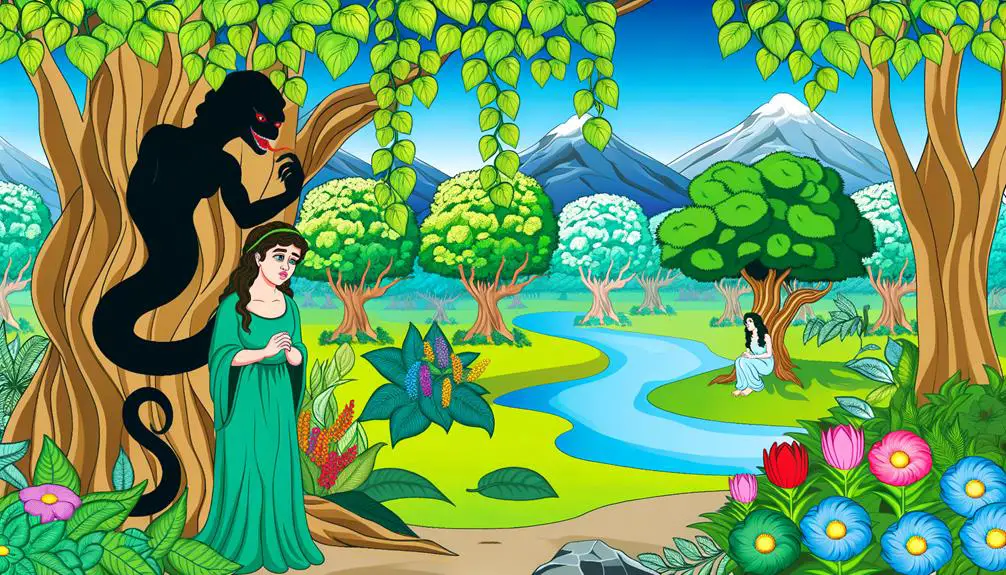
The origins of discord in Genesis can be traced back to the pivotal moment when Eve, influenced by the serpent, makes the decision to eat the forbidden fruit, thus introducing conflict and disharmony into the previously harmonious existence of humankind. This act, emblematic of the Garden temptation, underscores a fundamental aspect of human nature: the propensity to yield to temptation and the ensuing struggle between obedience and desire. The narrative doesn't merely recount the first act of disobedience but delves into the complexities of human nature, highlighting the inherent tension between the pursuit of knowledge and the adherence to divine commandments.
In analyzing this seminal event, it's clear that the introduction of discord isn't an arbitrary occurrence but a direct consequence of human actions and choices. The Garden temptation serves as a catalyst for the exploration of free will, with the serpent's persuasiveness and Eve's subsequent decision epitomizing the dilemmas faced by every individual. This episode in Genesis provides profound insights into the origins of discord, emphasizing the role of choice in the fracture of idyllic harmony.
Moreover, the repercussions of this act extend beyond the immediate punishment meted out to Adam and Eve, setting a precedent for the complex interplay between divine intentions and human agency. It reveals an intrinsic aspect of human nature: the inherent susceptibility to temptation and the inevitable introduction of discord when yielding to it. Thus, the origins of discord in Genesis aren't merely a historical account but a reflection on the enduring human condition, marked by the constant tension between obedience and rebellion, harmony and discord.
Prophetic Warnings Against Discord
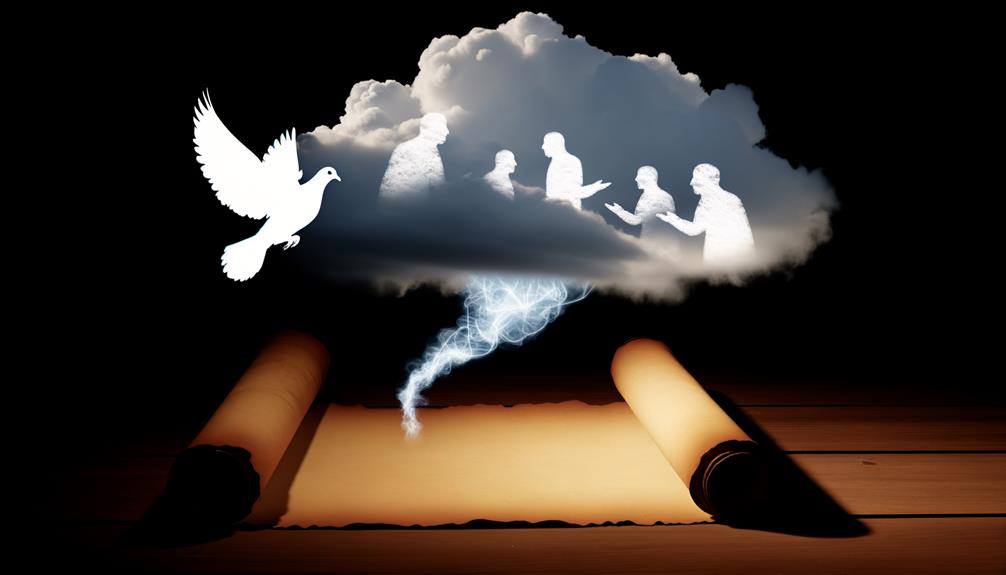
Building on the understanding of discord's origins in Genesis, biblical narratives also extend prophetic warnings against the consequences of discord among communities and nations. The scriptures meticulously outline how discord, not just earthly but also heavenly discord, can resonate with profound societal implications. Through a detailed examination, it's evident that the Bible portrays discord as a catalyst for divine judgment, societal fragmentation, and the erosion of communal harmony.
To capture the essence of these warnings, consider the following points:
- Heavenly discord leads to divine judgment: Biblical texts suggest that discord among the heavenly realm often precedes significant judgments upon the earth, underlining the interconnectedness of divine harmony and human welfare.
- Disunity undermines societal progress: Prophets warn that internal discord within a community or nation stalls progress, fosters injustice, and ultimately leads to downfall.
- A call for reconciliation and peace: Amidst warnings, there's a consistent call for reconciliation, emphasizing the restoration of harmony as a divine mandate.
- The ripple effect of discord: The societal implications of discord aren't localized; they ripple through generations, affecting the societal fabric in profound ways.
Analyzing these prophetic warnings, you're invited to reflect on the broader implications of discord in both a historical and contemporary context. The Bible frames discord as a pivotal concern with the power to shape the destiny of communities and nations. Understanding these warnings encourages a pursuit of harmony, underlining the timeless relevance of these biblical lessons in fostering societal cohesion and progress.
Discord Among the Disciples
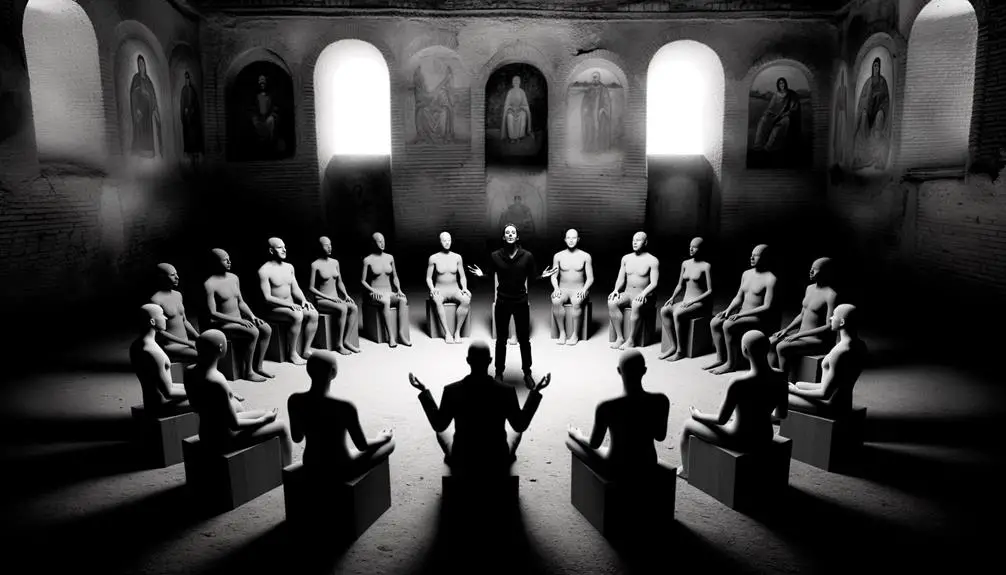
Even within the close-knit circle of Jesus' disciples, instances of discord emerge, reflecting broader themes of human nature and divine teaching. These episodes of disagreement among the disciples often revolve around power struggles and leadership debates, offering a rich tapestry for analyzing the dynamics of human relationships in the context of spiritual leadership.
Power struggles within the group are evident when you examine the disciples' conversations about who among them would be considered the greatest in the kingdom of heaven. Such discussions not only highlight their misunderstandings of Jesus' teachings on humility and service but also underscore the inherent human tendency to seek status and recognition. These power struggles, far from being petty squabbles, serve as a microcosm for larger human conflicts, illustrating how even those closest to divine teachings aren't immune to the pitfalls of ambition and vanity.
Leadership debates among the disciples further illuminate the complexities of spiritual leadership. Questions about who'd lead after Jesus' departure from the world didn't merely reflect concerns over organizational hierarchy but also deeper issues of faith, trust, and divine selection. These debates reveal the disciples' struggles with uncertainty and their journey towards understanding the nature of true leadership as service, rather than dominion.
Through these instances of discord, the Bible presents a nuanced view of human nature, exposing the disciples' vulnerabilities while also offering lessons on humility, service, and the true essence of leadership. In analyzing these moments, you gain insights into the challenges of living a life of faith amidst the imperfections of human nature.
Parables Addressing Discord
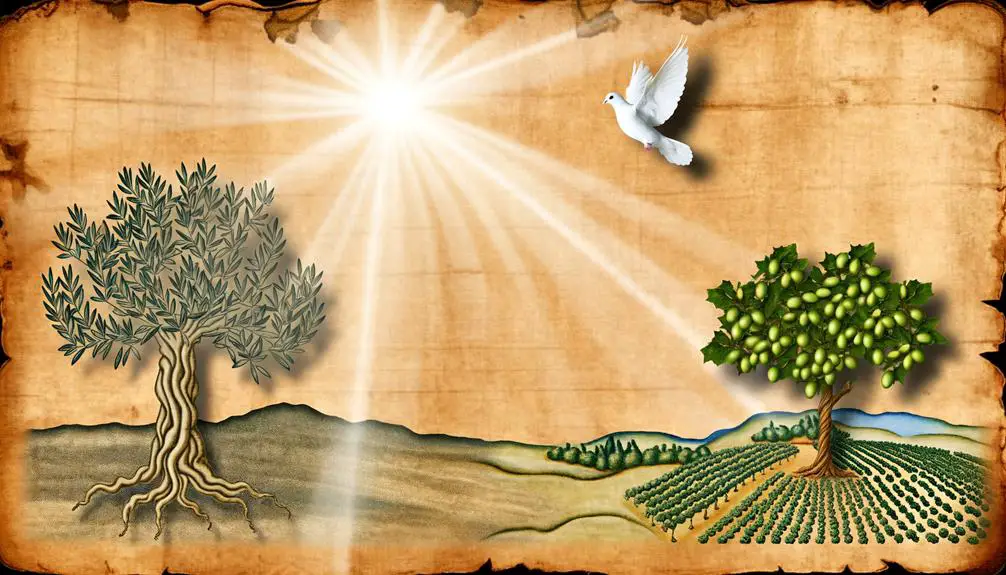
Within the biblical narrative, parables play a pivotal role in addressing the roots and repercussions of discord, offering profound insights into the resolution of conflict. These stories, rich with metaphorical depth, serve as vehicles for conveying the principles of Divine unity and conflict resolution. They illustrate not only the causes and effects of discord but also underscore the importance of harmony and reconciliation within the community.
To grasp the essence of how these parables address discord, consider the following key points:
- The Parable of the Lost Sheep: Demonstrates the value of every individual within a community, emphasizing that efforts to restore unity are paramount.
- The Parable of the Prodigal Son: Highlights the power of forgiveness and the joy of reconciliation, underscoring the importance of welcoming back those who've caused division.
- The Parable of the Wheat and the Weeds: Teaches patience and tolerance, acknowledging that premature judgments can lead to unnecessary discord within the community.
- The Parable of the Unforgiving Servant: Warns against the cycle of retaliation and the escalation of conflict, advocating for mercy as a cornerstone of conflict resolution.
These parables collectively underscore a critical message: Divine unity and conflict resolution are achievable through understanding, patience, forgiveness, and a concerted effort towards reconciliation. By analyzing these stories, you're invited to reflect on the multifaceted nature of discord and the pathways towards achieving harmony within any community.
Pathways to Reconciliation
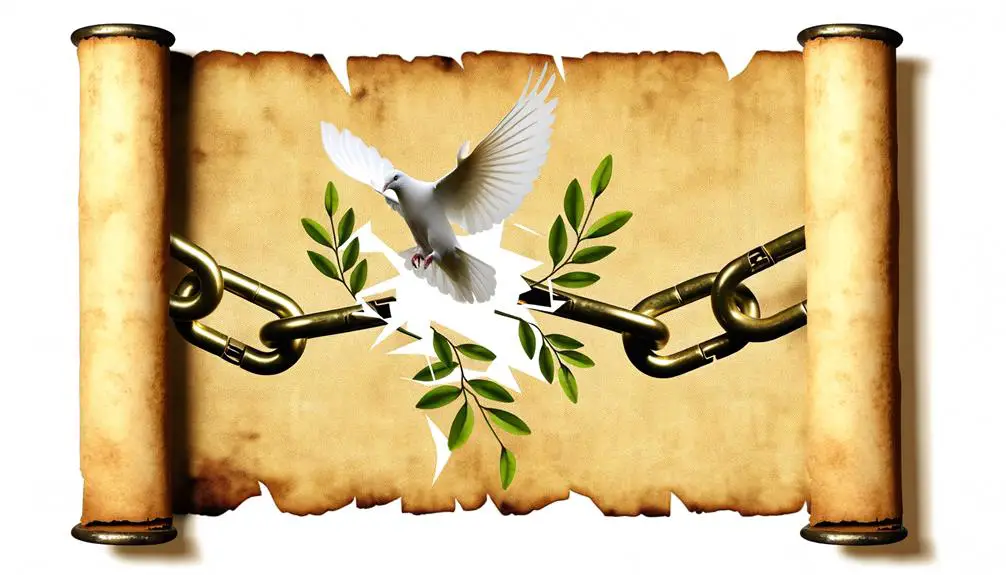
To navigate the complexities of reconciliation, one must first understand its foundational principles rooted in biblical teachings. The Bible emphasizes forgiveness practices and community healing as pivotal elements. These elements serve not only as moral imperatives but also as mechanisms through which individuals and communities can mend the fractures caused by discord.
Forgiveness practices, as depicted in biblical narratives, require an individual to confront personal grievances and extend pardon to those who've wronged them. This act isn't merely about absolving others but about liberating oneself from the burden of resentment. It's a transformative process that fosters inner peace and facilitates the restoration of broken relationships. However, forgiveness isn't an end in itself; it's a step towards the larger goal of community healing.
Community healing, in the biblical context, involves the collective effort of individuals within a community to reconcile differences and restore harmony. It's predicated on the understanding that communal well-being is intrinsically linked to the well-being of its members. Such healing processes are often facilitated through dialogue, mutual understanding, and concerted efforts to address underlying issues that contribute to discord.
In essence, the pathways to reconciliation outlined in the Bible underscore the importance of both individual and collective action. They suggest that true reconciliation requires a willingness to forgive, a commitment to heal together, and an acknowledgment of the interconnectedness of personal and communal peace. By adhering to these biblical principles, individuals and communities can navigate the path towards reconciliation, bridging divides and fostering a more harmonious coexistence.
Frequently Asked Questions
How Does the Concept of Discord in the Bible Correlate With Modern Psychological Understanding of Conflict Within Communities?
When you explore how discord relates to modern psychology, you'll find that personality traits and communication barriers often fuel community conflicts.
Essentially, the Bible's take on discord mirrors today's understanding that clashes often stem from diverse personalities failing to communicate effectively.
Are There Any Biblical Examples Where Discord Is Portrayed in a Positive Light or as a Necessary Step Towards Growth and Understanding?
You're exploring whether discord is ever shown positively in scriptural narratives, particularly as a catalyst for peaceful resolution or spiritual transformation.
While explicit examples are scarce, conflicts like Paul and Barnabas' disagreement led to the spread of their missions, indirectly fostering growth and understanding.
Such instances suggest that discord, while challenging, can serve a constructive role, paving the way for broader perspectives and deeper communal bonds when navigated with wisdom and compassion.
How Have Different Christian Denominations Interpreted the Theme of Discord in the Bible Differently, and How Does This Affect Their Teachings on Conflict Resolution in the Church?
In exploring how Christian denominations diverge on interpreting discord, you'll find denominational differences play a pivotal role. These variances influence teachings on conflict resolution, directly impacting church unity.
While some view discord as a catalyst for growth, urging open dialogue, others see it as a rift to be avoided. This discrepancy shapes how congregations navigate disagreements, underscoring the importance of understanding and respecting these theological nuances to foster a cohesive church environment.
What Are the Roles of Forgiveness and Repentance in Resolving Discord, According to Other Biblical Texts Not Specifically Focused on Conflict?
In resolving discord, forgiveness and repentance play pivotal roles across biblical texts. These concepts aren't just about mending personal relationships; they're tied to divine punishment and prophetic warnings.
How Can Biblical Teachings on Discord Inform Interfaith Dialogue and Cooperation in Today's Diverse Religious Landscape?
Imagine a tapestry woven with diverse threads, each representing a unique faith tradition. This imagery captures how biblical teachings on discord can foster cultural empathy and interfaith education, crucial for today's pluralistic society.
By promoting understanding and respect for differing beliefs, these teachings guide you towards collaborative solutions, enriching the fabric of our global community.
Analyzing these principles provides a scholarly and objective lens for enhancing interfaith dialogue and cooperation.
Conclusion
Ironically, while the Bible extensively chronicles discord, from its genesis in Eden to the disputes among Christ's disciples, it simultaneously paves a meticulous path towards reconciliation. This divine irony teaches you that discord isn't merely an obstacle but a necessary precursor to understanding and unity.
Through prophetic warnings and parables, the scriptures subtly hint that true harmony is achieved not by avoiding conflict, but by navigating through it with wisdom and grace, guiding you towards a more profound, collective peace.



Sign up